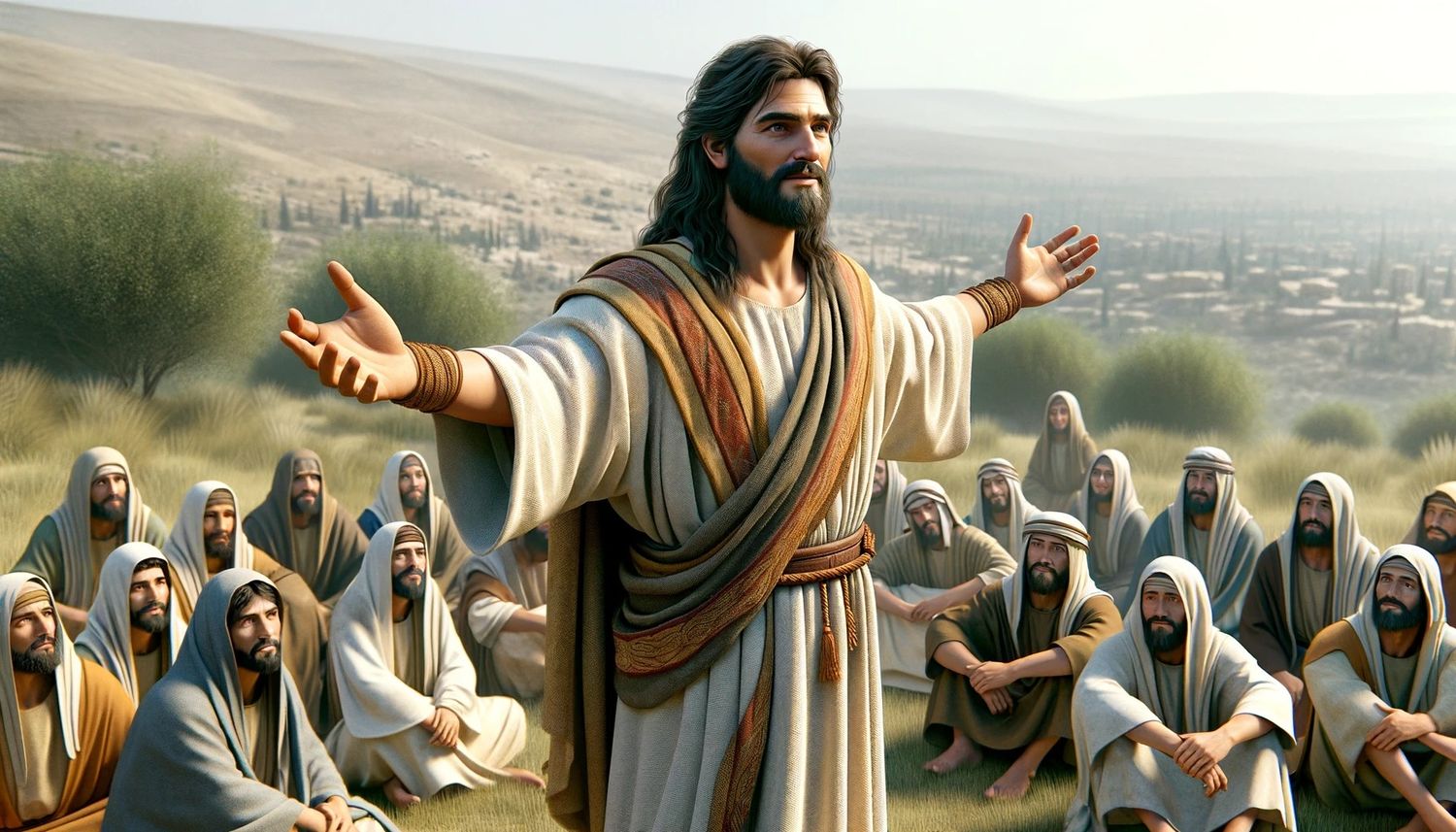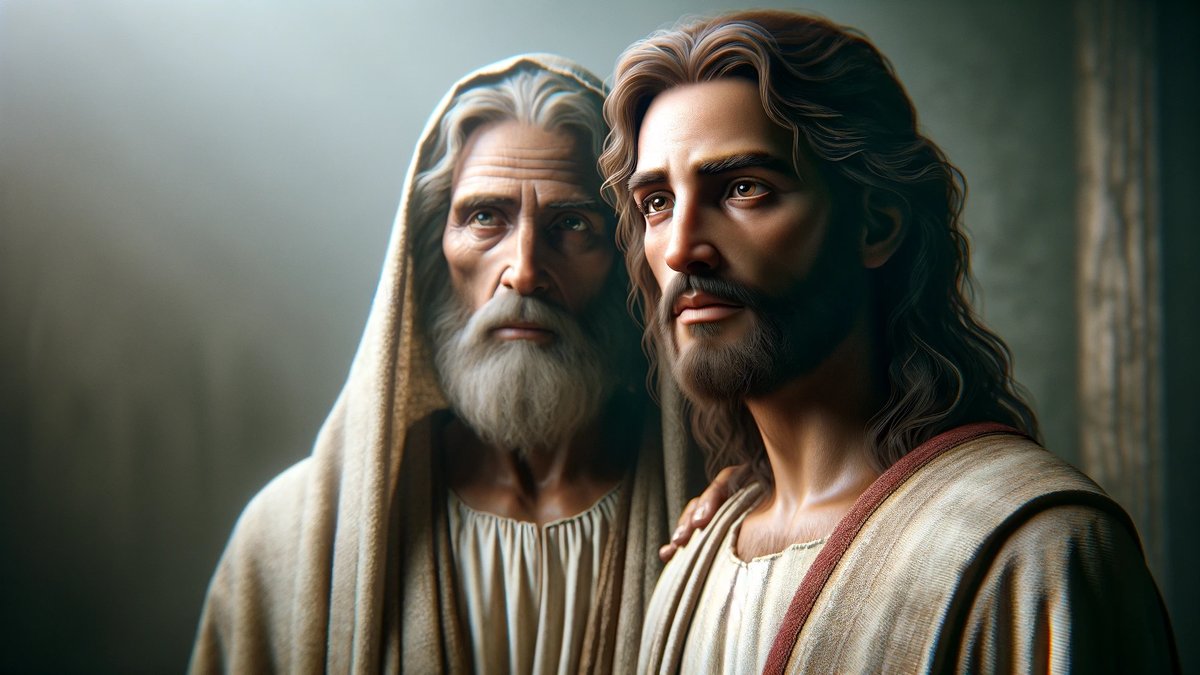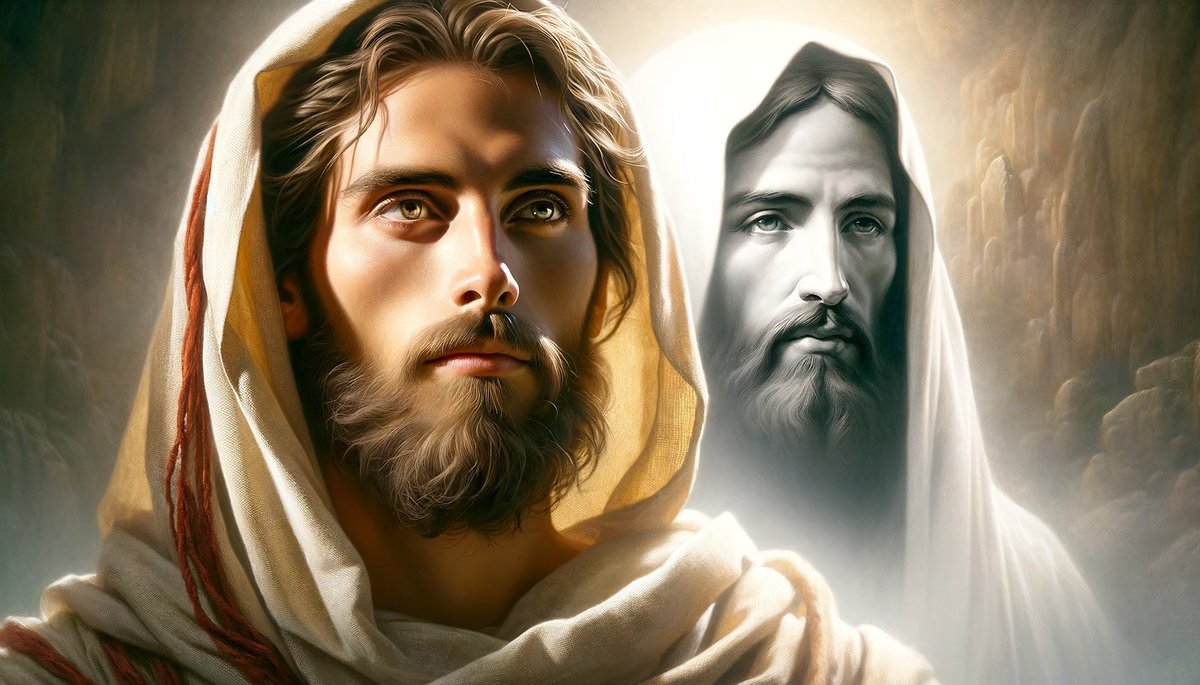Home>Theology and Spirituality>Who Were Jesus Of Nazareth And John The Baptist


Theology and Spirituality
Who Were Jesus Of Nazareth And John The Baptist
Published: February 23, 2024
Jason DeRose, Managing Editor at Christian.net, uses his expertise in religion and journalism to deepen understanding of faith's societal impacts. His editorial leadership, coupled with a strong academic background, enriches the platform’s diverse content, earning him recognition in both journalism and religious circles.
Discover the significance of Jesus of Nazareth and John the Baptist in theology and spirituality. Explore their teachings and impact on religious beliefs.
(Many of the links in this article redirect to a specific reviewed product. Your purchase of these products through affiliate links helps to generate commission for Christian.net, at no extra cost. Learn more)
Table of Contents
Introduction
The historical and spiritual significance of Jesus of Nazareth and John the Baptist is profound and enduring. Their lives and teachings have left an indelible mark on the course of human history and the development of spirituality. Understanding the context and impact of these two figures is essential for comprehending the roots of Christianity and the broader spiritual landscape.
Jesus of Nazareth, often referred to as Jesus Christ, is a central figure in Christianity and is also revered in other faith traditions. His life and teachings form the foundation of Christian belief, and his impact on the world is immeasurable. John the Baptist, a contemporary of Jesus, is recognized as a pivotal figure in the Christian narrative, heralding the arrival of Jesus and preparing the way for his ministry.
Exploring the early lives, ministries, and ultimate legacies of Jesus and John provides invaluable insights into the spiritual and historical tapestry of the time. Their intertwined destinies and the profound influence they wielded continue to resonate with millions of people around the globe.
As we delve into the lives of these two extraordinary individuals, we embark on a journey that transcends mere historical inquiry. Their stories are imbued with timeless wisdom, compassion, and a profound sense of purpose that continues to inspire and guide countless individuals in their quest for meaning and spiritual fulfillment.
Read more: Who Were John The Baptist’s Disciples
Early Life of Jesus of Nazareth
Jesus of Nazareth, also known as Jesus Christ, was born in Bethlehem, a town in Judea, during the reign of King Herod. His birth, widely celebrated as Christmas, is a cornerstone of the Christian faith. According to the Gospels of Matthew and Luke, Jesus was born to Mary, a young virgin, and Joseph, a carpenter. The circumstances surrounding his birth, including the humble setting of a manger and the visitation of shepherds and wise men, are deeply ingrained in Christian tradition and symbolism.
The early years of Jesus' life are shrouded in relative obscurity, with sparse historical documentation. However, biblical accounts depict his family's escape to Egypt to evade King Herod's decree to kill all male infants in Bethlehem. This event, known as the Flight into Egypt, underscores the perilous conditions that characterized the political landscape of the time.
As a child, Jesus grew up in Nazareth, a town in the region of Galilee, where he likely learned the trade of carpentry from his father. The Gospels offer a glimpse of Jesus' precocious wisdom and spiritual awareness, notably illustrated in the account of his visit to the temple in Jerusalem at the age of twelve. His profound understanding and engagement with the religious scholars present foreshadowed the extraordinary depth of insight that would come to define his adult ministry.
The early life of Jesus of Nazareth, though relatively scant in historical detail, is foundational to the Christian narrative. It sets the stage for the remarkable journey that would unfold, ultimately shaping the course of human spirituality and redemption. The humility of his birth, the trials faced by his family, and the enigmatic wisdom displayed in his youth all contribute to the profound mystique surrounding the figure of Jesus Christ. These formative years serve as a prelude to the transformative impact he would have on the world during his ministry and beyond.
Early Life of John the Baptist
John the Baptist, a central figure in the Christian narrative, was born in the first century in the region of Judea. His birth, like that of Jesus, is surrounded by divine intervention and prophetic significance. According to the Gospel of Luke, John's parents, Zechariah and Elizabeth, were righteous and devout individuals who had longed for a child but were unable to conceive due to Elizabeth's advanced age. However, an angel appeared to Zechariah, announcing that Elizabeth would bear a son who would be named John and would be filled with the Holy Spirit from birth.
John spent his formative years in the wilderness, where he grew in spiritual strength and devotion. His ascetic lifestyle and unwavering commitment to his divine calling set him apart even from a young age. The Gospel of Luke describes how John matured and became strong in spirit, living in the desert until the time of his public ministry.
The influence of the prophet Elijah loomed large over John's life and mission. His attire, consisting of a garment of camel's hair with a leather belt around his waist, and his diet of locusts and wild honey, mirrored the ascetic practices associated with the ancient prophet. This deliberate emulation served to underscore John's role as a herald of a new era and a voice crying out in the wilderness, preparing the way for the coming of the Messiah.
John's upbringing and early years in the wilderness cultivated a profound sense of purpose and a deep connection to the spiritual heritage of his people. His unwavering commitment to righteousness and his fervent call to repentance resonated with those who sought spiritual renewal and a return to the core values of their faith.
The early life of John the Baptist, characterized by divine intervention, solitude, and spiritual fortitude, laid the groundwork for his pivotal role as the forerunner of Jesus Christ. His singular devotion to his calling and his unyielding commitment to proclaiming a message of repentance and spiritual awakening foreshadowed the transformative impact he would have on the religious landscape of his time.
Ministry of John the Baptist
John the Baptist's ministry was characterized by a fervent call to repentance and spiritual renewal, marking a significant departure from the religious norms of his time. Emerging from the wilderness, John embarked on a mission that would reverberate across Judea and beyond, drawing multitudes to the banks of the Jordan River where he preached and baptized.
Central to John's ministry was his impassioned plea for individuals to repent of their sins and turn their hearts back to God. His message resonated with a diverse audience, transcending social and religious boundaries. People from all walks of life, including tax collectors, soldiers, and ordinary citizens, were drawn to John's proclamation of a baptism of repentance for the forgiveness of sins.
John's uncompromising stance on moral integrity and ethical conduct challenged the prevailing religious establishment, prompting a reevaluation of spiritual priorities among the populace. His emphasis on genuine transformation and ethical living struck a chord with those disillusioned by empty religious formalities and moral laxity.
The baptismal ritual administered by John symbolized a profound commitment to spiritual purification and a readiness to embrace a renewed way of life. This symbolic act of immersion in the waters of the Jordan River signified a decisive break from the past and a conscious step towards spiritual rebirth and moral uprightness.
Beyond his compelling message of repentance, John also prophesied the imminent arrival of the Messiah, heralding a new era of divine intervention and redemption. His proclamation that "the kingdom of heaven has come near" stirred anticipation and a sense of expectancy among his followers, igniting hope for a transformative spiritual awakening.
John's ministry, characterized by moral clarity, spiritual anticipation, and a resolute call to authentic repentance, laid the groundwork for the profound impact he would have on the religious landscape of his time. His unwavering commitment to truth and righteousness, coupled with his prophetic insight into the coming of the Messiah, positioned him as a pivotal figure in the unfolding narrative of divine redemption and spiritual renewal.
Ministry of Jesus of Nazareth
The ministry of Jesus of Nazareth stands as a transformative and enduring testament to compassion, spiritual insight, and divine revelation. Emerging from the obscurity of his early years, Jesus embarked on a mission that would redefine the spiritual landscape of his time and resonate across centuries.
Central to Jesus' ministry was his proclamation of the "kingdom of God," a profound and revolutionary concept that challenged prevailing religious paradigms. His teachings emphasized love, forgiveness, and the restoration of brokenness, offering a radical vision of spiritual renewal and divine grace. Through parables, sermons, and personal encounters, Jesus conveyed timeless truths that transcended cultural and societal barriers, speaking directly to the human heart.
Miracles formed an integral part of Jesus' ministry, serving as tangible demonstrations of divine power and compassion. Healing the sick, restoring sight to the blind, and even raising the dead, Jesus' miraculous deeds bore witness to the profound depth of his divine authority and the boundless nature of God's love. These acts of compassion and restoration not only alleviated physical suffering but also symbolized the spiritual wholeness and redemption that Jesus came to offer.
In his interactions with individuals from all walks of life, Jesus exemplified a spirit of inclusivity and compassion that defied social norms and religious conventions. His outreach to the marginalized, his embrace of the outcast, and his unwavering commitment to uplifting the downtrodden reflected a profound embodiment of divine love and solidarity with the human condition.
The ethical teachings of Jesus, encapsulated in the Sermon on the Mount and various ethical injunctions, presented a vision of moral integrity and spiritual authenticity that transcended legalistic interpretations of religious duty. His emphasis on humility, mercy, and peacemaking underscored a transformative ethic that continues to inspire individuals and communities worldwide.
Ultimately, the culmination of Jesus' ministry found its profound expression in his sacrificial death and triumphant resurrection. The redemptive significance of these events, central to Christian faith, embodies the transformative power of divine love and the promise of spiritual renewal for all humanity.
Jesus of Nazareth's ministry, characterized by compassion, divine revelation, and a radical vision of spiritual renewal, continues to resonate with individuals seeking meaning, purpose, and a deeper connection to the transcendent. His enduring impact transcends historical boundaries, offering a timeless invitation to embrace a vision of love, grace, and spiritual wholeness that remains as compelling and transformative today as it was in ancient times.
Read more: Who Were John The Baptist Disciples
Relationship between Jesus and John
The relationship between Jesus of Nazareth and John the Baptist is a pivotal aspect of their intertwined narratives, underscoring a profound connection that transcends mere historical coincidence. While their paths diverged in terms of their specific roles and missions, their bond as contemporaries and spiritual heralds is imbued with profound significance.
John the Baptist, as the forerunner of Jesus, played a crucial role in preparing the way for the ministry of the Messiah. His proclamation of repentance and the imminent arrival of the kingdom of God set the stage for the transformative message that Jesus would later expound. John's baptism, symbolic of spiritual purification and readiness for the coming of the Messiah, served as a precursor to the profound spiritual initiation that Jesus would bring to humanity.
Upon encountering Jesus at the Jordan River, John recognized the profound spiritual authority and divine significance embodied in Jesus. His acknowledgment of Jesus as the "Lamb of God" and the one who would baptize with the Holy Spirit and fire underscored his deep spiritual insight and recognition of Jesus' unique role in the redemptive narrative.
The relationship between Jesus and John was characterized by a seamless transition of spiritual authority and a shared commitment to ushering in a new era of divine intervention and redemption. While John's ministry focused on repentance and moral renewal, Jesus' message expanded upon this foundation, emphasizing the boundless love and grace of God and offering a vision of spiritual wholeness and reconciliation.
Despite their distinct roles, the lives of Jesus and John intersected in a profound and transformative manner, laying the groundwork for a spiritual legacy that continues to resonate with millions of individuals across diverse cultural and religious contexts. Their relationship exemplifies a seamless continuity of divine purpose and a shared commitment to illuminating the path toward spiritual renewal and redemption.
The bond between Jesus and John transcends historical chronicles, encapsulating a profound spiritual synergy that reverberates through the annals of human spirituality. Their interconnected narratives serve as a testament to the timeless significance of their collaborative mission, offering a compelling vision of divine purpose and the transformative power of spiritual solidarity.
Death of John the Baptist
The demise of John the Baptist stands as a poignant and pivotal moment in the narrative of early Christianity. His unwavering commitment to truth and righteousness, coupled with his prophetic insight into the coming of the Messiah, positioned him as a pivotal figure in the unfolding narrative of divine redemption and spiritual renewal.
The circumstances leading to John's death were fraught with political intrigue and moral complexity. According to the Gospels, John had incurred the ire of Herod Antipas, the ruler of Galilee and Perea, by publicly denouncing his unlawful marriage to Herodias, the wife of his brother Philip. Herodias harbored deep animosity towards John and sought an opportunity to eliminate him.
The opportunity presented itself during a banquet held by Herod to celebrate his birthday. Herodias' daughter, Salome, danced before the guests, captivating Herod to the extent that he made a rash promise to grant her any request. Prompted by her mother, Salome demanded the head of John the Baptist on a platter.
Despite his personal regard for John and an awareness of his righteousness, Herod, bound by his oath and the pressure of public perception, reluctantly acceded to the request. John was subsequently executed, and his head was presented to Salome, fulfilling the gruesome request made under the influence of her mother's vengeful scheme.
The death of John the Baptist reverberated across the region, eliciting profound grief and outrage among his followers and those who had been impacted by his message of repentance and spiritual renewal. His martyrdom underscored the perilous intersection of religious conviction and political power, serving as a stark reminder of the moral and ethical challenges inherent in confronting injustice and moral compromise.
The legacy of John the Baptist, encapsulated in his unwavering commitment to truth and righteousness, endures as a testament to the transformative power of moral courage and spiritual conviction. His martyrdom stands as a poignant symbol of the enduring struggle for justice and ethical integrity, inspiring generations to uphold the principles of righteousness and moral clarity in the face of adversity and moral compromise.
Death of Jesus of Nazareth
The death of Jesus of Nazareth, known as the crucifixion, stands as a defining moment in the narrative of Christianity and the spiritual history of humanity. The events leading to his crucifixion are deeply intertwined with the political, religious, and social dynamics of the time, culminating in a profound and transformative act of divine sacrifice.
According to the Gospels, Jesus was betrayed by one of his disciples, Judas Iscariot, and subsequently arrested by the religious authorities in Jerusalem. The charges brought against him, including claims of blasphemy and sedition, led to a series of trials before both Jewish and Roman authorities. Despite the lack of substantial evidence, the mounting pressure from religious leaders and the volatile political climate ultimately resulted in Jesus being sentenced to death by crucifixion.
The crucifixion itself was a harrowing and agonizing ordeal, symbolizing the depths of human suffering and the profound nature of divine love. Jesus, bearing the weight of the sins of humanity, endured unimaginable physical and emotional torment as he was nailed to the cross and left to die. The excruciating nature of crucifixion, coupled with the public spectacle and mockery that accompanied it, underscored the profound depths of Jesus' sacrificial act.
Amidst the darkness and despair that shrouded the crucifixion, a transcendent and redemptive truth emerged. Jesus' final words, including his prayer for forgiveness for those who crucified him and his declaration of surrender to the divine will, encapsulated a spirit of boundless compassion and unwavering faith. The profound significance of his sacrificial death, as a manifestation of divine love and the ultimate expression of solidarity with humanity, reverberates through the annals of Christian faith and spiritual contemplation.
The death of Jesus of Nazareth, though marked by profound suffering and apparent defeat, ultimately gave way to the transformative reality of resurrection and the promise of eternal life. The redemptive significance of his death, symbolizing the atonement for human sin and the triumph of divine love over the forces of darkness, remains a central tenet of Christian belief and a source of profound spiritual contemplation.
The crucifixion of Jesus stands as a testament to the enduring power of sacrificial love and the transformative nature of divine redemption. It serves as a poignant reminder of the profound depths of compassion and the ultimate triumph of light over darkness, offering a timeless invitation to embrace the transformative power of divine love and the promise of spiritual renewal.
Legacy of Jesus and John
The legacy of Jesus of Nazareth and John the Baptist transcends the confines of historical chronicles, permeating the spiritual consciousness of humanity with enduring significance. Their lives, teachings, and ultimate sacrifices have left an indelible mark on the fabric of human spirituality, shaping the course of religious thought and moral conviction across centuries.
Jesus' legacy is characterized by a profound vision of divine love and redemptive grace that continues to inspire individuals and communities worldwide. His teachings, encapsulated in the Sermon on the Mount and parables such as the Good Samaritan and the Prodigal Son, offer timeless insights into the transformative power of compassion, forgiveness, and ethical living. The ethical teachings of Jesus present a vision of moral integrity and spiritual authenticity that transcends legalistic interpretations of religious duty, resonating with individuals seeking a deeper connection to the transcendent.
The crucifixion and subsequent resurrection of Jesus stand as a transformative testament to the enduring power of sacrificial love and the promise of eternal life. The redemptive significance of his death, symbolizing the atonement for human sin and the triumph of divine love over the forces of darkness, remains a central tenet of Christian belief and a source of profound spiritual contemplation.
John the Baptist's legacy, rooted in his unwavering commitment to truth and righteousness, endures as a testament to the transformative power of moral courage and spiritual conviction. His proclamation of repentance and the imminent arrival of the kingdom of God set the stage for the transformative message that Jesus would later expound. John's martyrdom stands as a poignant symbol of the enduring struggle for justice and ethical integrity, inspiring generations to uphold the principles of righteousness and moral clarity in the face of adversity and moral compromise.
The intertwined legacies of Jesus and John serve as a testament to the timeless significance of their collaborative mission, offering a compelling vision of divine purpose and the transformative power of spiritual solidarity. Their enduring impact transcends historical boundaries, offering a timeless invitation to embrace a vision of love, grace, and spiritual wholeness that remains as compelling and transformative today as it was in ancient times.














